Japan is a country famous for its rich and diverse culinary traditions. From delicate and intricately prepared sushi to comforting bowls of ramen, Japanese food in Japan has captured the hearts and taste buds of people around the world.
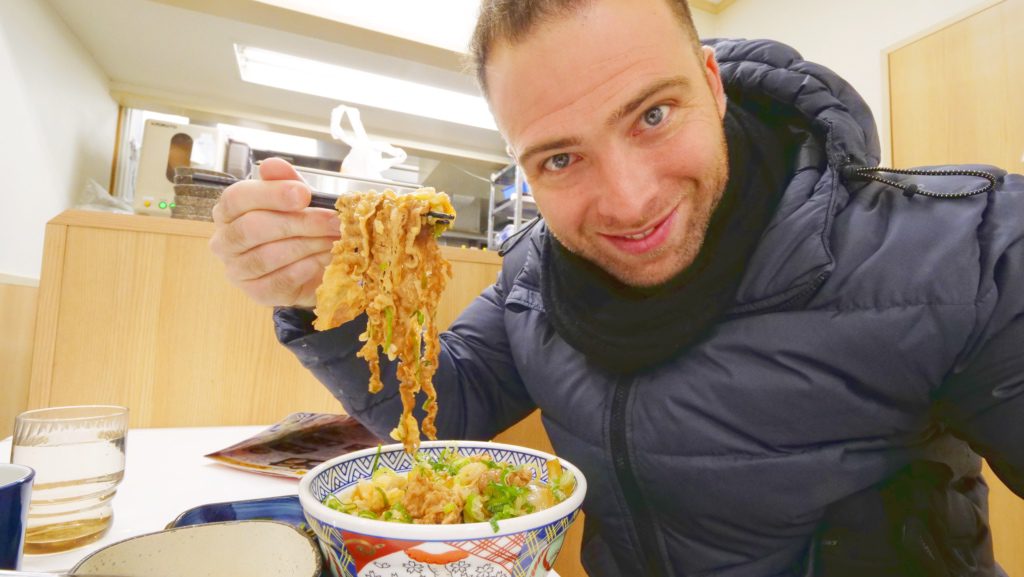
I visited Japan in January 2019 for a two-week-long food tour that took me through Tokyo, Kyoto, Osaka, and the prefectures around Tokyo. Japanese food in Japan hits differently than having it anywhere else, and it blew me away. Join me on this gastronomic journey as we explore the top Japanese foods that you must try when visiting the Land of the Rising Sun.
Japanese cuisine is a reflection of the country’s history, culture, and natural bounty. With a strong emphasis on fresh and seasonal ingredients, Japanese dishes often feature beautiful presentations and meticulous preparations. Refined over centuries, the art of Japanese cooking boasts many unique specialties from regions across the country.
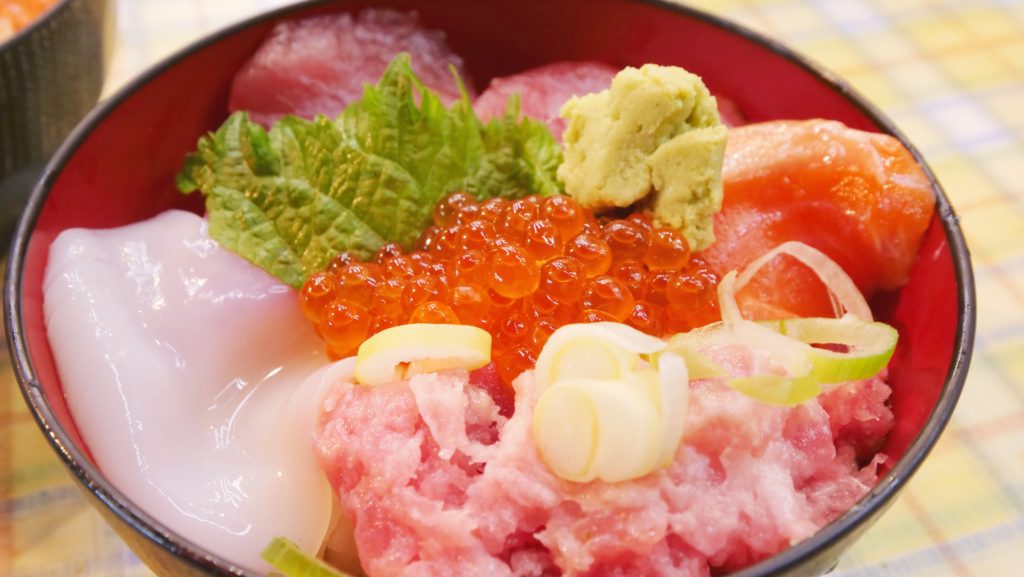
One of the defining characteristics of Japanese cuisine is the use of umami, the fifth basic taste. Umami, which translates to “pleasant savory taste” in English, occurs naturally in ingredients like kombu (seaweed), shiitake mushrooms, and soy sauce. This flavor profile adds depth and richness to Japanese dishes, making them incredibly flavorful and satisfying.
Japan is famous worldwide for its inventive cuisine. Historically influenced by Chinese cuisine, Japanese food famously utilizes rice, fresh vegetables, and seafood. The use of spices and oil is minimal, as is red meat.

Some of the top Japanese foods in Japan include sushi, ramen, tempura, yakitori, and udon. Two of the island’s most famous dishes, sushi and ramen, are popular snacks and meals around the world. Their globalization shows the growing influence Japanese cuisine has had on cultures around the world. In this guide, I’m diving into the Japanese food in Japan I loved the most during my trip!
No exploration of Japanese foods in Japan would be complete without mentioning sushi. This iconic dish consists of vinegared rice combined with various toppings, such as raw or cooked seafood, vegetables, or egg.

Sushi is not only a feast for the taste buds but also a visual delight. The artistry and precision involved in crafting each piece of sushi is truly awe-inspiring. I’ve been eating sushi since I was a kid, but there’s nothing like having it in Japan. It’s some of the freshest fish I’ve ever had in my life and is a must for any sushi lover!
Onigiri, also known as rice balls, are a staple when it comes to quick and easy Japanese foods in Japan. These portable snacks consist of triangular balls of rice filled with savory ingredients like salmon, fish roe, or vegetables.

They come wrapped with seaweed, making them a quick and savory meal on the go! I tried them for the first time on the Narita Express on my way into Tokyo and fell in love with them!
Originating from the Kansai and Hiroshima regions, okonomiyaki is a savory pancake-like dish that is a must-try in Japan. The batter consists of flour, grated yam, water, and shredded cabbage. Popular toppings include pork, shrimp, squid, and cheese.
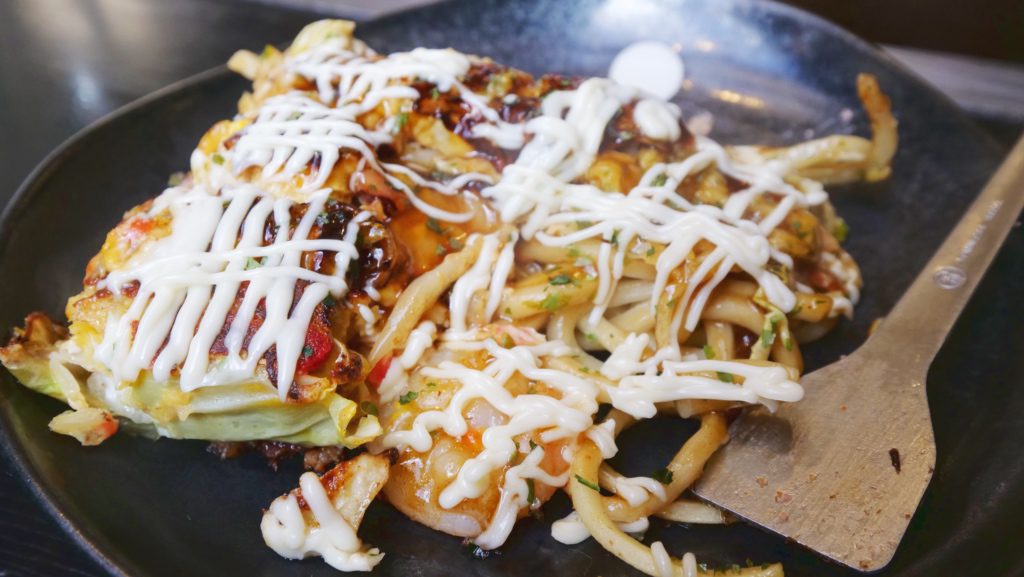
Okonomiyaki is typically cooked on a teppan, a type of flat iron griddle, and topped with a tangy and slightly sweet sauce, mayonnaise, and bonito flakes. They’re crunchy, crispy, and full of flavor!
Mochi is a traditional Japanese sweet consisting of glutinous rice pounded into a sticky and chewy paste. This delightful treat comes in various flavors and shapes and is an extremely popular Japanese food in Japan and a delicious snack!
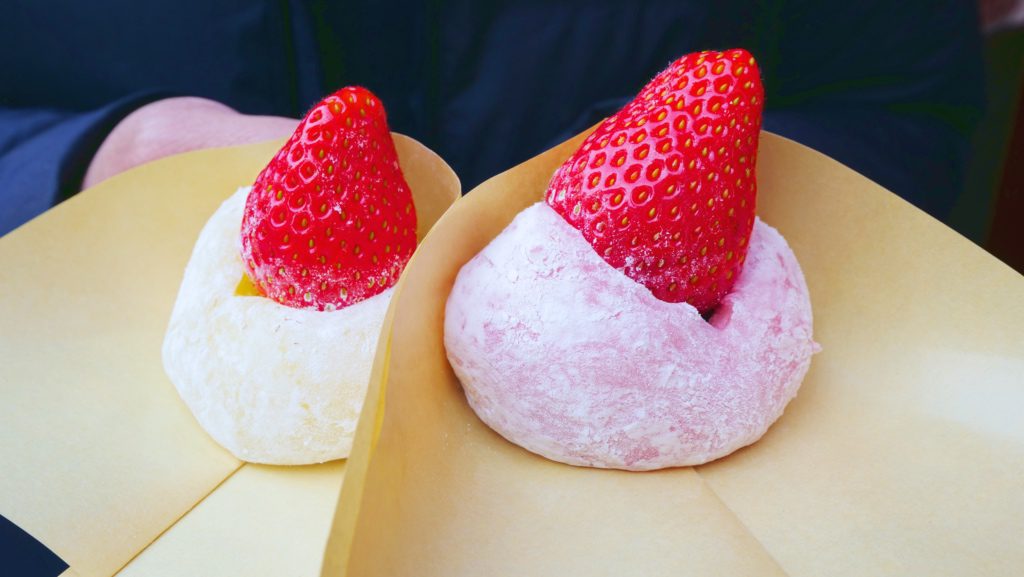
Mochi often contain sweet fillings like red bean paste or strawberries, or simply dusted with kinako (roasted soybean flour) for a nutty flavor. There are many varieties, including kibi dango, green tea, and my favorite, ichigo daifuku!
Takoyaki are octopus-filled fritters found in street food markets throughout Japan. These golden, crispy spheres consist of a savory batter poured into a special takoyaki pan. Diced octopus, green onions, and tempura scraps are popular additions.
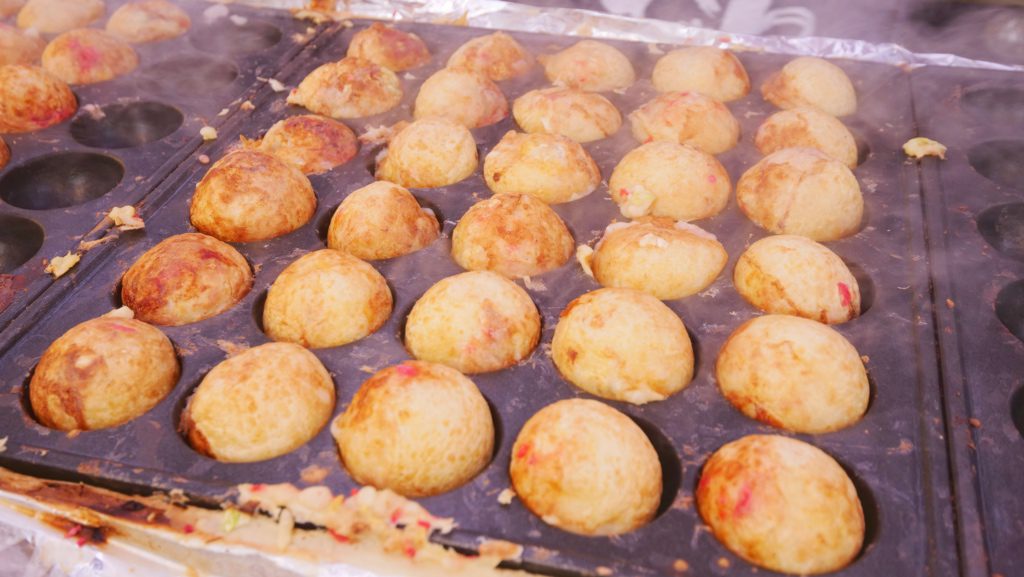
Once cooked, the cooks add takoyaki sauce, mayonnaise, bonito flakes, and seaweed. They’re soft and delicate, and an incredibly tasty Japanese food in Japan. I first tried them in Kyoto and loved them so much, I went back for round two in Osaka!
Ningyoyaki are small pancakes that have been staples in Japan for centuries. These adorable treats come in various shapes, including pagodas, dolls, and even birds! They’re made from a batter of flour, sugar, and eggs, which is poured into molds and cooked until fluffy and golden.

Like a lot of sweet Japanese food in Japan, ningyoyaki are often filled with sweet red bean paste and make for a delightful snack while on the go. I loved munching on these crispy morsels as I explored Tokyo!
No list of Japanese food in Japan is complete without ramen. Ramen is a beloved comfort food in Japan, consisting of wheat noodles served in a flavorful broth. This dish has countless regional variations, each with its own distinct flavor profile and toppings.
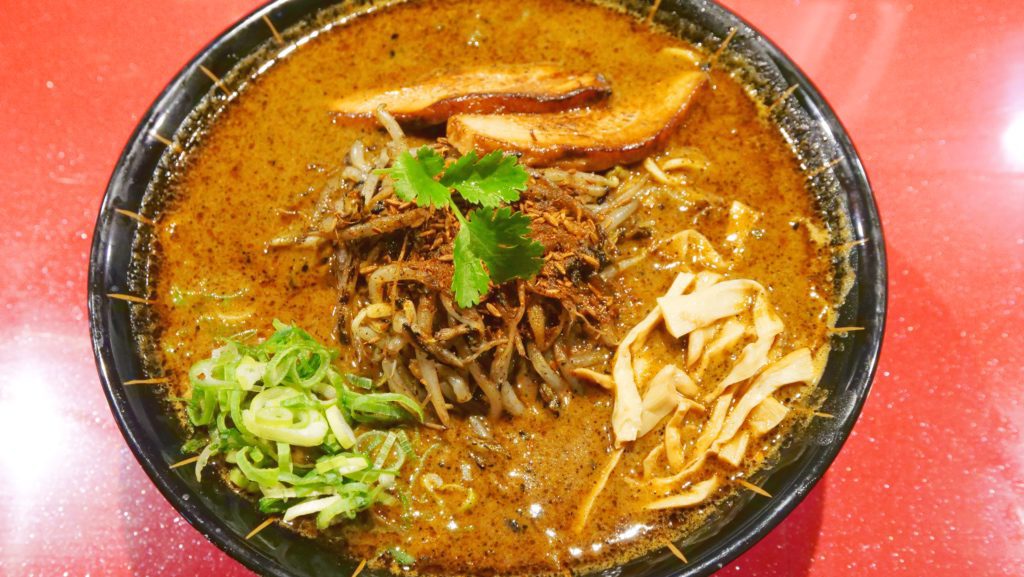
From the rich and creamy tonkotsu ramen of Fukuoka to the soy-based shoyu ramen of Tokyo, there is a bowl of ramen to suit every palate. Some of my favorites contained Iberian pork, but I also adored the Indian fusion ramens I tried in Tokyo.
Gyoza are pan-fried dumplings that originated in China. They’ve since become a beloved fixture of Japanese food in Japan. These crescent-shaped delights typically contain a mixture of ground pork, cabbage, garlic, and ginger, and come with a tangy dipping sauce.
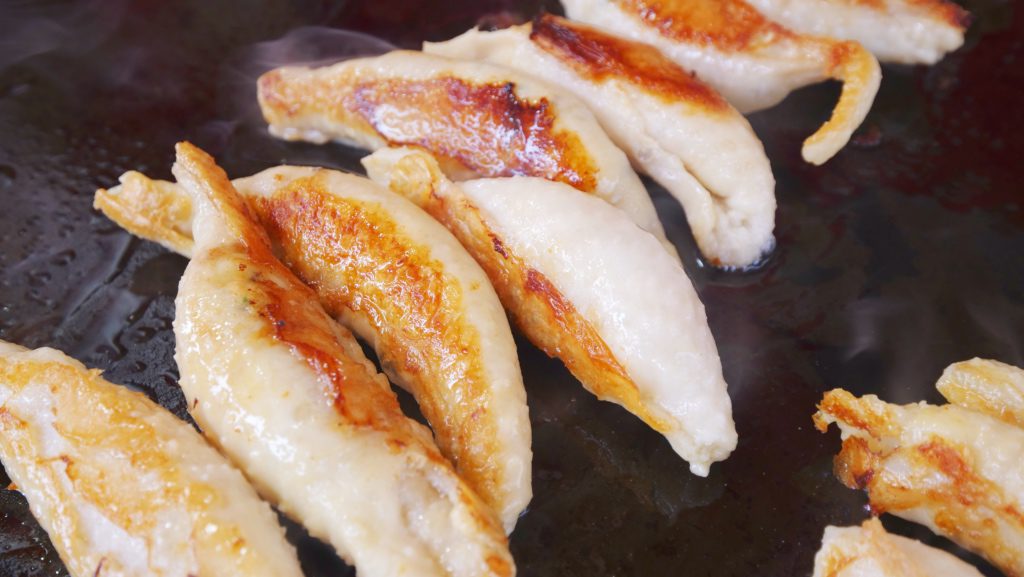
Gyoza are crispy on the outside and juicy on the inside, making them a popular appetizer or snack. My favorite gyoza were wrapped in crispy, fried chicken skin, which I tried in Kyoto. I’ve had many gyoza in my life, but these were so unique and memorable!
Yakitori is a type of skewered grilled meat. They’re a common staple in Japanese izakayas, or pubs, and contain a soy-based marinade. They’re then cooked over charcoal until they are tender and slightly charred.
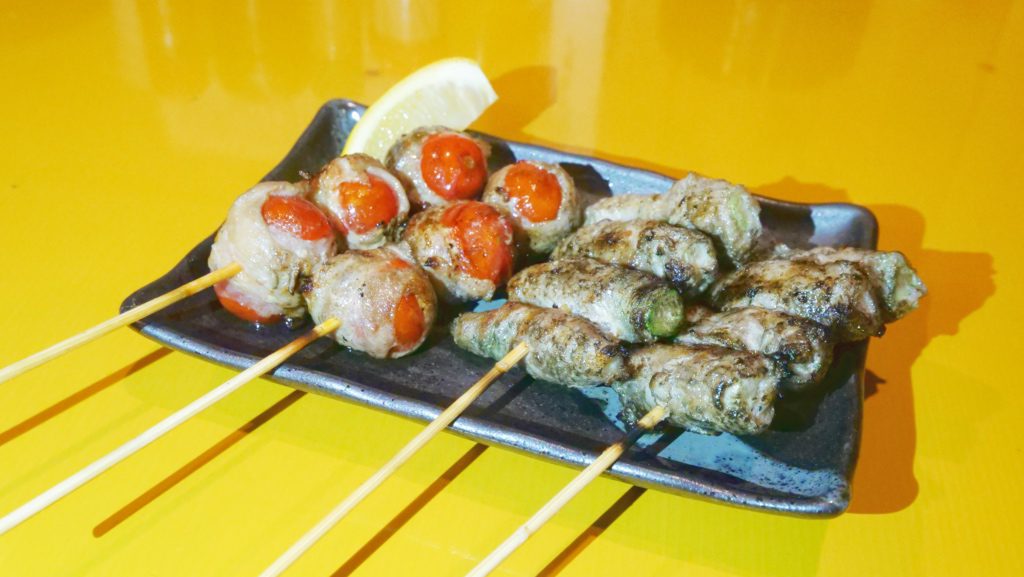
Yakitori often come with a variety of dipping sauces and pairs well with a cold beer or sake. I tried many types of yakitori during my time in Japan, including chicken, beef, and even chicken balls with melted cheese! As far as Japanese food in Japan goes, yakitori is top notch.
Sake, also known as rice wine, is a traditional Japanese alcoholic beverage made from fermented rice. This versatile drink can range from light and fruity to rich and complex, depending on the brewing process and ingredients used.

Sake is enjoyed on its own or paired with a variety of dishes, and is an integral part of Japanese culture and cuisine. I tried many varieties of sake during my time in Japan, from izakaya-hopping tours in Tokyo, to tofu-rich lunches in Kyoto, to traditional breweries in the shadow of Mount Fuji. Just don’t drink too much—it can be very strong!
Karaage is a Japanese cooking technique that involves deep-frying bite-sized pieces of marinated meat, typically chicken. The result is tender and flavorful morsels with a crispy exterior. If you can find this Japanese food in Japan, I suggest you jump on it—it’s amazing!
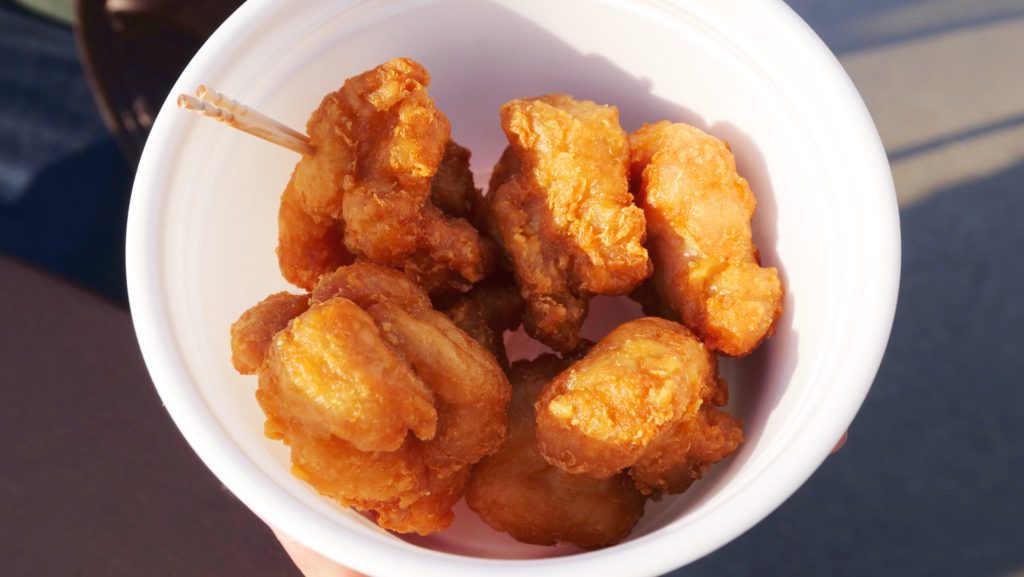
Karaage is often served as an appetizer or as a main course. It’s also a popular street food! I tried some in Osaka, which blew my mind. The meat was tender and juicy and had an irresistible crunchy coating that made my mouth water.
Japanese cuisine is a treasure trove of flavors, textures, and culinary techniques. From the delicate artistry of sushi to the comforting warmth of a bowl of ramen, each dish tells a story and offers a glimpse into the rich culture and history of Japan.
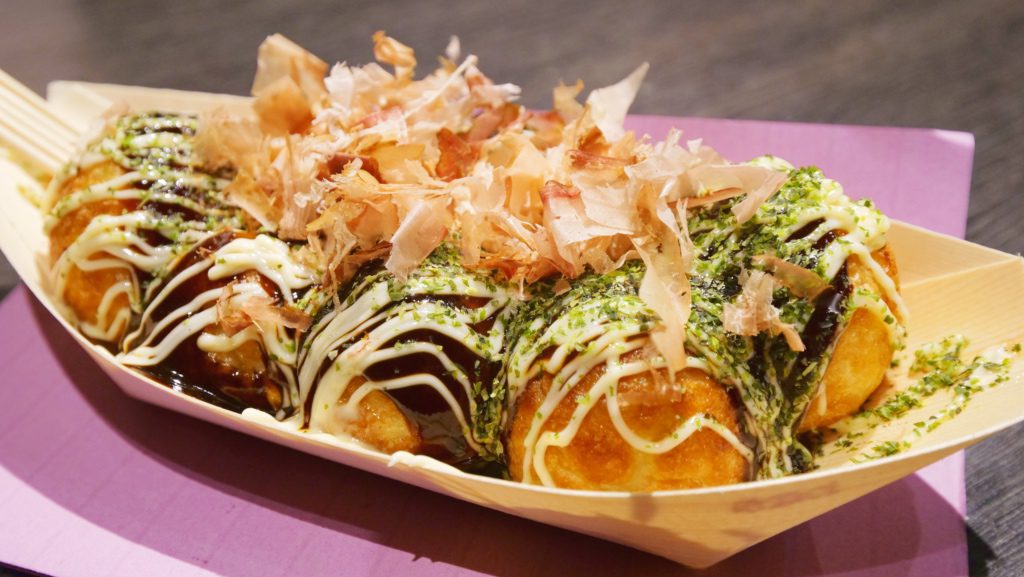
Whether you are a food enthusiast or simply looking to expand your culinary horizons, exploring the world of Japanese food in Japan is an experience like no other. So pack your bags, embark on a culinary adventure, and let your taste buds guide you through the gastronomic wonders of the Land of the Rising Sun.
Counter
101 Countries • 1432 Cities